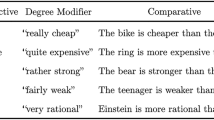Abstract
Fitch’s paradox shows, from fairly innocent-looking assumptions, that if there are any unknown truths, then there are unknowable truths. This is generally thought to deliver a blow to antirealist positions that imply that all truths are knowable. The present paper argues that a probabilistic version of antirealism escapes Fitch’s result while still offering all that antirealists should care for.
Similar content being viewed by others
References
Achinstein P. (2001) The Book of Evidence. Oxford: Oxford University Press
Adler, J., 2002. Belief ’s Own Ethics, Cambridge MA: MIT Press.
Albert, D., 1992. Quantum Mechanics and Experience, Cambridge MA: Harvard University Press.
Beall, J. C., 2000. ‘Fitch’s Proof, Verificationism and the Knower Paradox,’ Australasian Journal of Philosophy 78:241–247.
Bird A. (1998) Philosophy of Science. London: UCL Press
Brogaard, B. and Salerno, J., 2002. ‘Clues to the Paradoxes of Knowability: Reply to Dummett and Tennant,’ Analysis 62:143–150.
DeRose, K., 2002. ‘Assertion, Knowledge, and Context,’ Philosophical Review 111:167–203.
Devitt, M., 1983. ‘Dummett’s Anti-Realism,’ Journal of Philosophy 80:73–99.
Dorling, J., 1979. ‘Bayesian Personalism, the Methodology of Scientific Research Programs, and Duhem’s Problem,’ Studies in the History and Philosophy of Science 10:177–187.
Douven, I., 1999a. ‘Inference to the Best Explanation Made Coherent,’ Philosophy of Science 66:S424–S435.
Douven, I., 1999b. ‘Putnam’s Model-Theoretic Argument Reconstructed,’ Journal of Philosophy 96:479–490.
Douven, I., 1999c. ‘A Note on Global Descriptivism and Putnam’s Model-Theoretic Argument,’ Australasian Journal of Philosophy 77:342–348.
Douven, I., 2002a. ‘A New Solution to the Paradoxes of Rational Acceptability,’ British Journal for the Philosophy of Science 53:391–410.
Douven, I., 2002b. ‘Testing Inference to the Best Explanation,’ Synthese 130:355–377. meta-induction has lost much of its skeptical force. Secondly, the argument from theism is weak, as Kvanvig admits (p. 49), because it not only depends on the plausibility of theism but also on that of some rather specific theistic assumptions.
Douven, I., 2005a. ‘A Principled Solution to Fitch’s Paradox,’ Erkenntnis 62:47–69.
Douven, I., 2005b. ‘Evidence, Explanation, and the Empirical Status of Scientific Realism,’ Erkenntnis 63:253–291.
Douven, I., 2006. ‘Assertion, Knowledge, and Rational Credibility,’ Philosophical Review 115:449–485.
Douven, I., 2007. ‘Underdetermination,’ in S. Psillos and M. Curd (eds.) The Routledge Companion to the Philosophy of Science, London: Routledge, in press.
Douven, I., and Horsten, L., 1998. ‘Earman on Underdetermination and Empirical Indistinguishability,’ Erkenntnis 49:303–320.
Douven, I., and Meijs, W., 2006. ‘Bootstrap Confirmation Made Quantitative,’ Synthese 49:97–132.
Douven, I., and Uffink, J., 2003. ‘The Preface Paradox Revisited,’ Erkenntnis 59:389–420.
Douven, I.,and Williamson, T., 2006. ‘Generalizing the Lottery Paradox,’ British Journal for the Philosophy of Science 57:755–779.
Dummett, M. A. E., 1976. ‘What Is a Theory of Meaning? (II),’ in G. Evans and J. McDowell (eds.) Truth and Meaning, Oxford: Clarendon Press, pp. 67–137.
Dummett, M. A. E., 1978. Truth and Other Enigmas, London: Duckworth.
Dummett, M. A. E., 1979. ‘Common Sense and Physics,’ in G. MacDonald (ed.) Perception and Identity, Ithaca NY: Cornell University Press, pp. 1–40.
Dummett, M. A. E., 2001. ‘Victor’s Error,’ Analysis 61:1–2.
Earman, J., 1992. Bayes or Bust?, Cambridge MA: MIT Press.
Earman, J., 1993. ‘Underdetermination, Realism, and Reason,’ in P. French, T. Uehling, Jr., and H. Wettstein (eds.), Midwest Studies in Philosophy, Vol. XVIII, Notre Dame: University of Notre Dame Press, pp. 19–38.
Edgington, D., 1985. ‘The Paradox of Knowability,’ Mind 94:557–568.
Fitch, F. B., 1963. ‘A Logical Analysis of Some Value Concepts,’ Journal of Symbolic Logic 28:135–142.
Fitelson, B. 2001. Studies in Bayesian Confirmation Theory, doctoral dissertation, University of Wisconsin–Madison.
Fitelson, B., and Waterman, A., 2005. ‘Bayesian Confirmation and Auxiliary Hypotheses: A Reply to Strevens,’ British Journal for the Philosophy of Science 56:293–302.
Fodor, J., 1998. Concepts: Where Cognitive Science Went Wrong, Oxford: Clarendon Press.
Foley, R., 1992. ‘The Epistemology of Belief and the Epistemology of Degrees of Belief,’ American Philosophical Quarterly 29:111–124.
Gaifman, H., and Snir, M., 1982. ‘Probabilities over Rich Languages,’ Journal of Symbolic Logic 47:495–548.
Hand, M., 2003. ‘Knowability and Epistemic Truth,’ Australasian Journal of Philosophy 81:216–228.
Hand, M., and Kvanvig, J., 1999. ‘Tennant on Knowability,’ Australasian Journal of Philosophy 77:422–428.
Harman, G., 1973. Thought, Princeton NJ: Princeton University Press.
Harré, R., 1988. ‘Realism and Ontology,’ Philosophia Naturalis 25:386–398.
Jeffreys, H. 1961. Theory of Probability (3rd ed.), Oxford: Clarendon Press.
Joyce, J., 2004. ‘Bayesianism,’ in A. Mele and P. Rawling (eds.) The Oxford Handbook of Rationality, Oxford: Oxford University Press, pp. 132–155.
Kaplan, M., 1981. ‘A Bayesian Theory of Rational Acceptance,’ Journal of Philosophy 78:305–330.
Kemeny, J., 1955. ‘Fair Bets and Inductive Probabilities,’ Journal of Symbolic Logic 20:263–273.
Kirkham, R., 1992. Theories of Truth, Cambridge MA: MIT Press.
Kitcher, P., 1993. The Advancement of Science, Oxford: Oxford University Press.
Kripke, S., 1975. ‘Outline of a Theory of Truth,’ Journal of Philosophy 72:690–716.
Kroon F. (1993) ‘Rationality and Epistemic Paradox’. Synthese 94:377–408
Künne, W., 2003. Conceptions of Truth, Oxford: Oxford University Press.
Kvanvig, J., 1995. ‘The Knowability Paradox and the Prospects for Anti-Realism,’ Noûs 29:481–499.
Kvanvig, J., 2006. The Knowability Paradox, Oxford: Oxford University Press.
Kyburg, H., 1990. Science and Reason, Oxford: Oxford University Press.
Laudan, L., 1981. ‘A Confutation of Convergent Realism,’ Philosophy of Science 48:19–49.
Lewis, D., 1996. ‘Elusive Knowledge,’ Australasian Journal of Philosophy 74:549–567. (Reprinted in K. DeRose and T. Warfield (eds.), Skepticism, Oxford: Oxford University Press, 1999, pp. 220–239; the page reference is to the reprint.)
McGinn, C., 1980. ‘Truth and Use,’ in M. Platts (ed.), Reference, Truth and Reality, London: Routledge, pp. 19–40.
Milne, P., 1991. ‘A Dilemma for Subjective Bayesians—and How to Resolve it,’ Philosophical Studies 62:307–314.
Moore, G. E., 1962. Commonplace Book: 1919–1953, London: Allen and Unwin.
Pacuit, E., and Parikh, R., 2005. ‘The Logic of Communication Graphs,’ in J. Leite, A. Omicini, P. Torroni, and P. Yolum (eds.), Proceedings of DALT 2004 (Lecture Notes in Computer Science 3476), Berlin: Springer, pp. 256–269.
Prawitz, D., 1977. ‘Meaning and Proofs: On the Conflict Between Classical and Intuitionistic Logic,’ Theoria 48:2–40.
Prawitz, D. 1994. ‘Meaning Theory and Anti-Realism,’ in B. McGuinness and G. Oliveri (eds.), The Philosophy of Michael Dummett, Dordrecht: Kluwer, pp. 79–89.
Psillos, S., 1999. Scientific Realism: How Science Tracks Truth, London: Routledge.
Putnam, H., 1977. ‘Realism and Reason,’ Proceedings and Addresses of the American Philosophical Association 50:483–498. (Reprinted in his Meaning and the Moral Sciences, London: Routledge, 1978, pp. 123–138; the page reference is to the reprint.)
Putnam, H., 1980. ‘Models and Reality,’ Journal of Symbolic Logic 45:464–482. (Reprinted in his Realism and Reason, Cambridge: Cambridge University Press, 1983, pp. 1–25; the page reference is to the reprint.)
Putnam, H., 1983. ‘Equivalence,’ in his Realism and Reason, Cambridge: Cambridge University Press, pp. 26–45.
Reichenbach, H., 1938. Experience and Prediction, Chicago: University of Chicago Press.
Savage, L., 1972. The Foundations of Statistics (2nd ed.), New York: Dover.
Skyrms, B. 1980. ‘Higher Order Degrees of Belief,’ in D. H. Mellor (ed.), Prospects for Pragmatism, Cambridge: Cambridge University Press, pp. 109–137.
Sobel, J. H., 1987. ‘Self-Doubts and Dutch Strategies,’ Australasian Journal of Philosophy 65:56–81.
Stalnaker, R., 1970. ‘Probability and Conditionals,’ Philosophy of Science 28:64–80.
Strevens, M., 2001. ‘The Bayesian Treatment of Auxiliary Hypotheses,’ British Journal for the Philosophy of Science 52:515–538.
Strevens, M., 2005. ‘The Bayesian Treatment of Auxiliary Hypotheses: Reply to Fitelson and Waterman,’ British Journal for the Philosophy of Science 56:913–918.
Tennant, N., 1990. Natural Logic, Edinburgh: Edinburgh University Press.
Tennant, N., 1997. The Taming of the True, Oxford: Oxford University Press.
Tennant, N., 2001a. ‘Is Every Truth Knowable? Reply to Williamson,’ Ratio 14:263–280.
Tennant, N., 2001b. ‘Is Every Truth Knowable? Reply to Hand and Kvanvig,’ Australasian Journal of Philosophy 79:107–113.
Unger, P., 1975. Ignorance: A Case for Scepticism, Oxford: Clarendon Press.
van Dalen, D., 1994. Logic and Structure (3rd ed.), Berlin: Springer.
van Fraassen, B., 1989. Laws and Symmetry Oxford: Clarendon Press.
Wansing, H., 2002. ‘Diamonds Are a Philosopher’s Best Friends,’ Journal of Philosophical Logic 31:591–612.
Williamson, T., 1988. ‘Knowability and Constructivism,’ Philosophical Quarterly 38:422–432.
Williamson, T., 1993. ‘Verificationism and Non-Distributive Knowledge,’ Australasian Journal of Philosophy 71:78–86.
Williamson, T., 2000a. ‘Tennant on Knowable Truth,’ Ratio 13:99–114.
WilliamsonT. (2000b) Knowledge and Its Limits. Oxford: Oxford University Press
Wright C. (1987) Realism, Meaning and Truth. Oxford: Blackwell
Author information
Authors and Affiliations
Corresponding author
Rights and permissions
About this article
Cite this article
Douven, I. Fitch’s Paradox and Probabilistic Antirealism. Stud Logica 86, 149–182 (2007). https://doi.org/10.1007/s11225-007-9058-5
Published:
Issue Date:
DOI: https://doi.org/10.1007/s11225-007-9058-5




